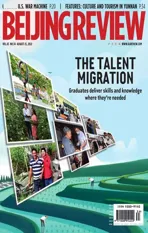THIS WEEK
2022-08-24
SPREADING WINGS

The campus of the Hong Kong University of Science and Technology (Guangzhou) in Guangzhou, capital of Guangdong Province on August 16. After three years of construction, the university is scheduled to open in September.
Fishing Season

Fishing boats sail from the Tailu fishing port in Lianjiang County of Fuzhou, Fujian Province. Local fishermen began their fishing work as a three-and-a-half-month seasonal fishing moratorium was lifted in some sea areas of Fujian on August 16.
Childbirth Supporting Measures
In a bid to promote balanced long-term population development, the central authorities have introduced a raft of policies for prenatal and postnatal support on August 16, focusing on reducing the burdens on families.
The supporting measures include better maternal care services and public childcare services, improved maternity and parental leave policies,preferential policies on housing and taxation, and the fostering of fertility-friendly workplaces,according to a guideline released by the National Health Commission in collaboration with 16 other departments.
Hainan’s COVID-19 Fight
China’s island province of Hainan had readied 26,103 quarantine rooms and 21,003 makeshift beds as of August 16 to cope with the latest COVID-19 resurgence, local authorities said on August 17.
On August 16, Hainan reported 482 new confirmed local cases and 1,181 new local asymptomatic carriers, according to the local COVID-19 prevention and control headquarters.
Between August 1 and 16, a total of 11,755 COVID-19 infections were reported in Hainan, of which 5,298 are confirmed and 6,457 are asymptomatic.
Hainan is continuing its efforts to facilitate the return of tourists stranded in the province.As of 6 a.m. August 17, 70,815 stranded visitors had departed Sanya and the provincial capital Haikou by plane.
Power Supply
China has taken steps to ensure adequate power supply to meet the growing demand for electricity during the summer, an official said on August 16.
Since the beginning of this summer, the demand for power has been constantly increasing, driven by the persistent high temperatures and quickened economic recovery,Jin Xiandong, an official with the National Development and Reform Commission, said at a news conference.
From August 1 to 14, the average daily coal consumption of monitored power plants stood at 8.16 million tons, an increase of 15 percent from one year earlier.The daily coal consumption reached an all-time high of 8.49 million tons on August 3.
China has worked to elevate its coal production in face of the sharp rise in power demand, with the average coal output at 12.4 million tons each day since July,a relatively high level, according to the commission.
The agency vowed to expand the advanced coal production capacity and promote the implementation of mid-term and longterm contracts in a bid to secure sufficient power and electricity supply.
Meteorological Services
China will reinforce its meteorological services for tourism during the peak travel season,the China Meteorological Administration said on August 15.
Numbers of tourists at natural mountain and water attractions have seen an uptick,and are a risk at such sites during the flood season, according to a circular issued by the administration.
Monitoring and early warning systems for sudden meteorological disasters should be strengthened, it continued.
Public awareness of weather disaster prevention should be improved among tourists, and disaster prevention and relief training for staff at natural attractions should also be advanced,the circular said.
River Restoration
The city of Guilin in Guangxi Zhuang Autonomous Region has launched an integrated conservation and restoration project in the Lijiang River basin to protect its ecological environment,Xinhua reported on August 13.
A total of 83 sub-projects,with an investment of over 5.49 billion yuan ($814.4 million),will be implemented over three years, according to the city’s natural resources authorities.
Hailed as one of the most beautiful rivers on Earth, the Lijiang River, where clean water flows between scenic karst mountains, winds through four counties in Guilin. The Lijiang River has not only been mentioned in Chinese textbooks but also appears on the back of China’s 20-yuan banknote.
In recent years, China has been making continuous efforts to better protect the ecological environment of the picturesque river.
Rural Road Construction
China will launch a new round of construction and rebuilding of rural roads, expand investment in rural construction and create more jobs for the rural population, amid efforts to consolidate poverty alleviation achievements and accelerate rural revitalization.
By 2025, a rural road network that is more convenient,efficient and inclusive will be built, with improvements made in road safety and transport services, according to a circular jointly issued by the Ministry of Transport and five other government bodies on August 15.
On top of the previously announced targets, China will step up policy support and complete the reconstruction of an extra 30,000 km of rural roads and rebuild another 3,000 unsafe road bridges in rural areas this year.
The country aims to bring the total investment in rural construction to around 100 billion yuan($14.76 billion), creating some 2 million local jobs for rural residents, according to the plan.
Work relief schemes will be promoted to involve more rural populations, especially people with low incomes, in the construction and maintenance of rural construction projects,in order to create more job opportunities for rural residents and increase their incomes.
Asian Games Venues
The Olympic Council of Asia announced last month that the 2022 Asian Games had been rescheduled for September 23-October 8, 2023, due to the COVID-19 pandemic. The Games were originally planned to take place from September 10 to 25,2022 in Hangzhou, Zhejiang Province.
However, the 56 competition venues and 31 training venues for the Asian Games are gradually opening to the public, and more than 42,000 citizens have accessed these venues for physical exercise since July 1, according to the Hangzhou Asian Games Organizing Committee.
The Games’ organizing committee has pledged to open venues in a controlled and orderly manner as it bids to protect and maintain the quality of the facilities.
Cooling Down
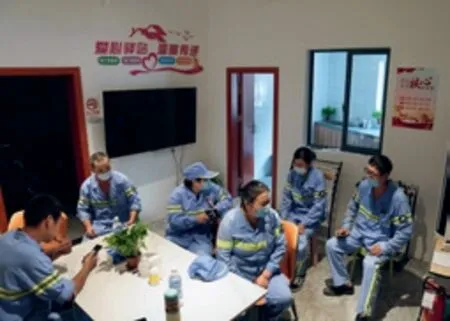
Sanitation workers chat at a rest station in Hongkou District, Shanghai,on August 16. Recently, a rest station has opened in the district for nearby sanitation, gardening, municipal and other outdoor workers.
Smart Exercise

Visitors learn about intelligent fitness devices at the 10th China Information Technology Expo in Shenzhen,Guangdong Province, on August 16.
Economic Recovery
The Chinese economy maintained its recovery trend in July with major economic indicators posting steady growth despite domestic COVID-19 flare-ups and heatwaves.
The value-added industrial output went up 3.8 percent year on year and 0.38 percent month on month, data from the National Bureau of Statistics(NBS) showed on August 15.
The retail sales of consumer goods climbed 2.7 percent year on year.
Other major economic indicators including the index of services production and fixed assets investment also posted year-on-year growth, the NBS data showed.
The surveyed urban unemployment rate continued to drop in July, down from 5.5 percent in June to 5.4 percent.
“The economy is still in the process of recovery with insufficient market demand being a big constraint,” NBS spokesperson Fu Linghui told a press conference, adding that the foundation for economic recovery needs to be consolidated.
Fu expected that household consumption will gradually recover with more sophisticated pandemic prevention and control and pro-consumption policies.
As disruptions to the industrial and supply chains are gradually being addressed, key industries such as automobiles are resuming normal production,which will continue to play a supporting role for industrial growth.
“Through joint efforts, economic recovery is expected to sustain its current momentum,”Fu said.
Overseas Investment
The world’s largest battery maker, China’s Contemporary Amperex Technology Co. Ltd.(CATL), is set to invest 7.34 billion euros ($7.47 billion) in building a plant to manufacture batteries for carmakers in Hungary. The investment is the largest ever in the history of Hungary, according to the country’s Minister of Foreign Affairs and Trade Peter Szijjarto.
CATL said in a statement that the 100-GWh battery plant in Debrecen, east Hungary, will supply both cells and modules to European carmakers.
The Debrecen project is CATL’s second European plant, following the first one in Germany.
CATL explained that it had chosen Debrecen as it is the second largest town in Hungary,and is located at the heart of Europe. It is also close to the plants of some of its own customers, such as Mercedes-Benz,BMW, Stellantis and Volkswagen.
In order to reduce its carbon footprint, CATL will use electricity from renewable energies, and is also considering developing solar power with Hungarian partners, the company said.
Construction of the new plant is expected to begin this year.
U.S. Exchange Delistings
The China Securities Regulatory Commission (CSRC) commented on August 12 on the recent decisions by a few Chinese companies to voluntarily delist from U.S. securities exchanges.
Listings and delistings are both common in capital markets.According to these companies’announcements, they have strictly observed relevant U.S.rules and regulations since listing in the U.S. markets, and the delisting decisions are made out of their business considerations,said a CSRC official in response to media requests.
“These companies are listed on multiple markets, and only a small portion of their securities are traded in the U.S. markets,”the official added.The delisting plan will not jeopardize these companies’fund-raising ability through domestic and overseas capital markets, according to the official.The CSRC respects these companies’ business-driven decisions in compliance with rules of the listing venue. It will continue to communicate and cooperate with relevant overseas regulators to jointly protect the legitimate rights and interests of issuers and investors, the official said.

Renminbi Bonds
Foreign institutional investors made more than 1.03 trillion yuan ($151.9 billion) of spot transactions of renminbi bonds in July, data from the China Foreign Exchange Trade System showed.
They bought 518.8 billion yuan ($76.51 billion) and sold 512.3 billion yuan ($75.55 billion)of such bonds, registering a net purchase of 6.5 billion yuan($960 million) following net sales for four months in a row.July also saw an increase of eight new overseas institutional investors engaging in trade in China’s bond market. By the end of July, the Chinese bond market had 1,051 overseas institutional investors in total.
Analysts attributed the growing interest in renminbi bonds to the country’s continuous economic recovery and a generally stable foreign exchange rate.
Geospatial Industry
The geospatial industry saw a compound output growth rate of 17.5 percent in the past decade,according to an industry report.
The total output of the industry amounted to 752.4 billion yuan ($110.96 billion) in 2021,said the report published at the 2022 Conference of Chinese Geospatial Industry and Sciences in Hefei, Anhui Province, on August 11-12.
The number of newly registered market entities in the sector stood at about 35,800 in 2021,up 29.2 percent year on year.
By the end of 2021, the number of employees in the industry had surpassed 3.98 million, up 18.5 percent year on year.China is briskly pushing forward the geospatial industry to bolster the digital economy.The Ministry of Natural Resources recently announced a pilot program of highprecision maps for intelligent connected vehicles.
EV Charging Points
The number of new charging points for electric vehicles (EVs)in China grew at a fast clip in July to meet the charging demand of the country’s ballooning EV community, industrial data showed.
By the end of the month,the country had about 3.98 million charging facilities, nearly double the number a year ago,according to the China Electric Vehicle Charging Infrastructure Promotion Alliance.
Some 47,000 public charging points were added in July,the alliance said.
The number of new private charging points also surged, rising over 390 percent during the first seven months of 2022.
The fast growth in charging facilities is generally in line with the country’s burgeoning newenergy vehicle sector, which registered a 120-percent yearon-year growth during the January-July period.
Box Office
The Chinese box office this summer had reached 7.382 billion yuan ($1.088 billion) as of August 13, already surpassing the total revenue for the last summer movie season, said the China Film Administration.
The top earners include the Chinese sci-fi comedyand the movie drama, which had raked in about 2.26 billion yuan($333.29 million) and 1.69 billion yuan ($249.23 million) as of August 12, respectively.
The summer movie season spans three months until August 31. In 2021, the box office revenue totaled 7.381 billion yuan ($1.08 billion).
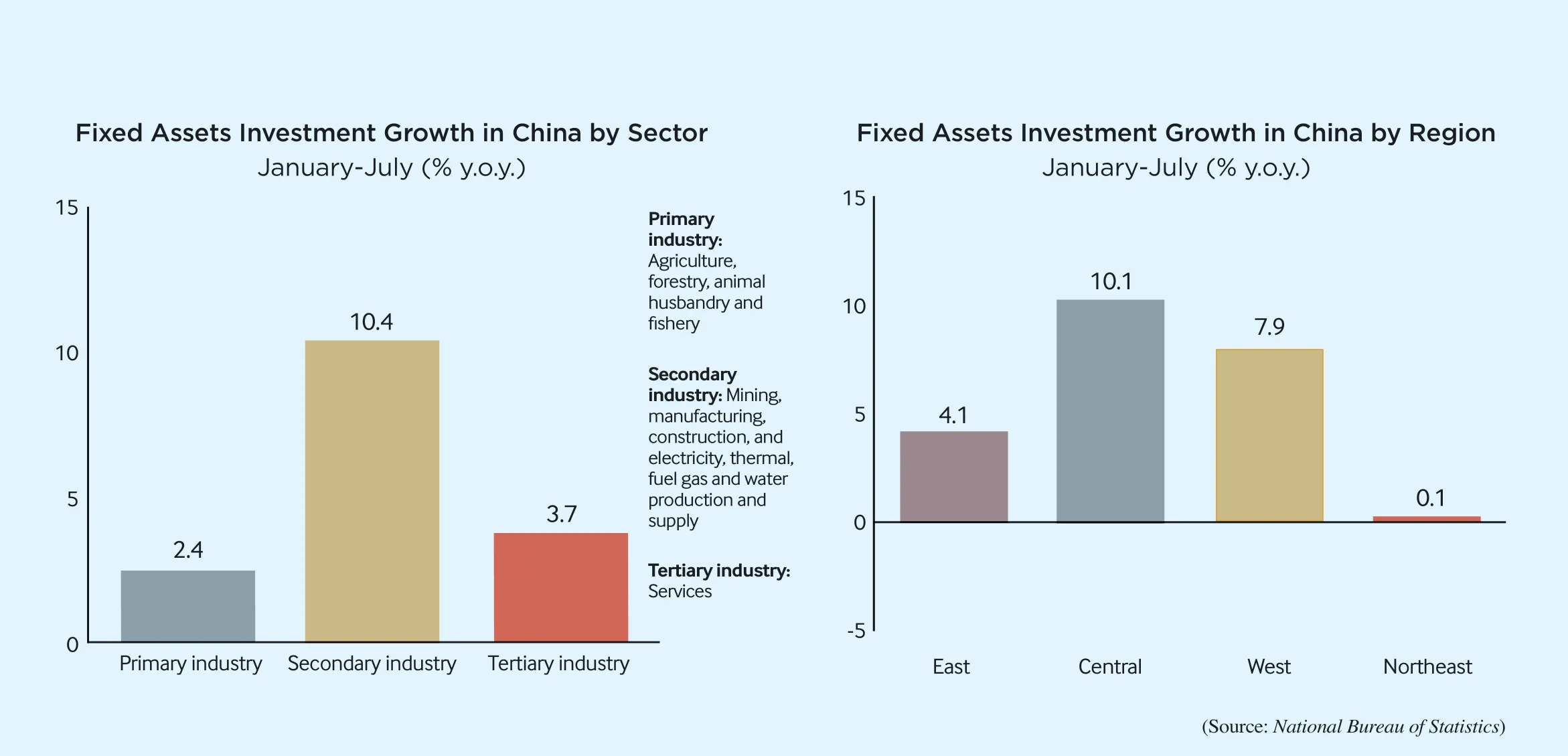


ASIAN VOLLEYBALL CONFEDERATION CUP CHAMPION
China’s volleyball ace Zhang Jingyin was named both Most Valuable Player and one of the Best Outside Spikers following China’s victory over Japan in the 2022 Asian Volleyball Confederation (AVC) Cup Final in Nakhon Pathom, Thailand, on August 14 to claim the trophy for the first time in 10 years.
Born in Xuzhou, Jiangsu Province, in 1999, Zhang started playing volleyball at the age of 13 and joined the provincial team in 2015. Four years later, he joined the national team.
Zhang’s teammates Zhang Zhejia and Peng Shikun shared the Best Middle Blockers award.
China last entered the AVC Cup Men’s Final in 2016, and last won the title in 2012. China will participate in the 2022 FIVB Volleyball Men’s World Championship in Poland and Slovenia from August 26 to September 11.

Some posts on WeChat, one of China’s most popular apps, recently claimed that mangoes produced in Panzhihua, Sichuan Province “could not be sold in time” and as a result “farmers were suffering huge losses.”
Local authorities responded that no mangoes are unmarketable and these posts take advantage of the consumer’s sympathy only to increase sales. It turned out that not only mangoes, but local pomegranates, apples and other fruits, too, were sold using the same plea for help.
Given this type of produce is prone to market volatility, the public easily empathizes with farmers.
But creating some fake “unmarketable”drama may drag down the prices of these particular fruits on the whole, disrupting market stability. In sum, selling fruits by taking advantage of the consumer’s sympathy violates the principle of fair competition and should be regulated.
“The legislation is a typical differentiated industry supporting policy with huge sums of subsidies to be provided to the U.S.chip sector.”
Shu Jueting, spokesperson for the Ministry of Commerce, expressing China’s opposition to the recently adopted U.S. Chips and Science Act on August 18
“China’s economy will continue to recover strongly in the second half of this year, boosted by the ongoing increases in industrial production,consumption and innovation.”
Kin Phea, Director General of the International Relations Institute at the Royal Academy of Cambodia,in a recent interview with Xinhua News Agency
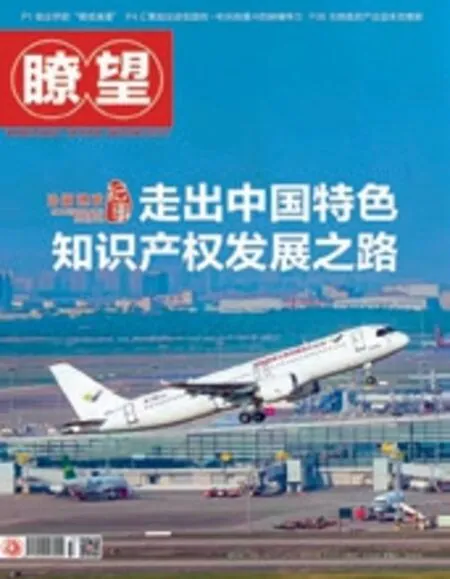
This May, the COMAC 919 (C919),China’s first domestically designed single-aisle passenger jet, successfully completed its maiden flight, marking a milestone in China’s aviation history.To manufacture the C919, China has overcome obstacles in more than 100 key technologies and applied for more than 10,000 patents. These key technologies and intellectual property rights (IPRs)provide a strong backstop for the C919 to compete in the global aviation market.
In the past, China mainly depended on the introduction of IPRs from other countries, but today it is creating its own,helping promote the high-quality development of the country’s economy.
The past decade has witnessed great achievements in China’s IPR protection.Reforms on the IPR protection mechanism have been intensified, with relevant laws and regulations hammered out one by one. China is actively engaging with global IPR governance under the framework of World Intellectual Property Organization (WIPO).
According to the WIPO, China’s ranking in the Global Innovation Index jumped from 35th place in 2013 to 12th in 2021, ranking first among middleincome countries.
The country has blazed a trail of IPR development with its own characteristics.
As a new consumption model, prepaid consumption has been on the rise in recent years. As this comes with considerable discounts, consumers are more than willing to give the model a go. But the reality is that many businesses take the prepayment and then vanish without a trace.These sham companies mostly operate in the sectors of beauty, physical fitness and tutoring. Though most disputes involve only small amounts of money, consumer confidence in the associated businesses does take a hit.
Most consumers are reeled in not because they go after the small gains, but because they really need whatever may be on offer.
It’s important to bring prepaid consumption back on track and spruce up its image. The key is to intensify supervision.Prepaid consumption is a form of fundraising based on a given business’ credibility,but both a threshold and guarantee should be in place and supported by a well-developed legal system.
FORMER LEGISLATOR SENTENCED
Shi Wenqing, 68, former Vice Chairperson of the Standing Committee of the Jiangxi Provincial People’s Congress, was sentenced to death with a two-year reprieve for taking bribes worth 195 million yuan ($29 million) and illegally owning firearms. All his personal assets were confiscated.
From 2003 to May 2020, Shi abused his position during his service period in Heilongjiang and Jiangxi provinces to illegally help others with financing and project contracting, as well as acquiring the right to use state-owned land. In return, he accepted bribes, directly and through relatives.
Shi also gave a pistol obtained from others to his relatives. In China, the law does not authorize civilians to own guns.
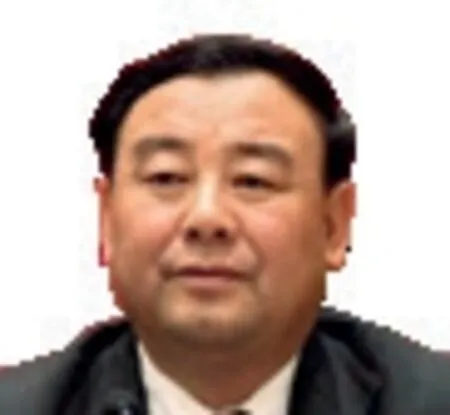
“The parties concerned should act prudently and stop any actions that exacerbate tension and confrontation and undermine mutual trust.”
Wang Wenbin, spokesperson for China’s Foreign Ministry, at a regular news briefing on August 16,commenting on a U.S.-Republic of Korea-Japan missile defense exercise off Hawaii’s coast
“G20 countries have the knowledge,expertise, and financial resources to help accelerate the recovery and resilience of developing, least developed, and small island developing states.”
Suharso Monoarfa, Indonesia’s Minister for National Development Planning, in a written statement on August 14
